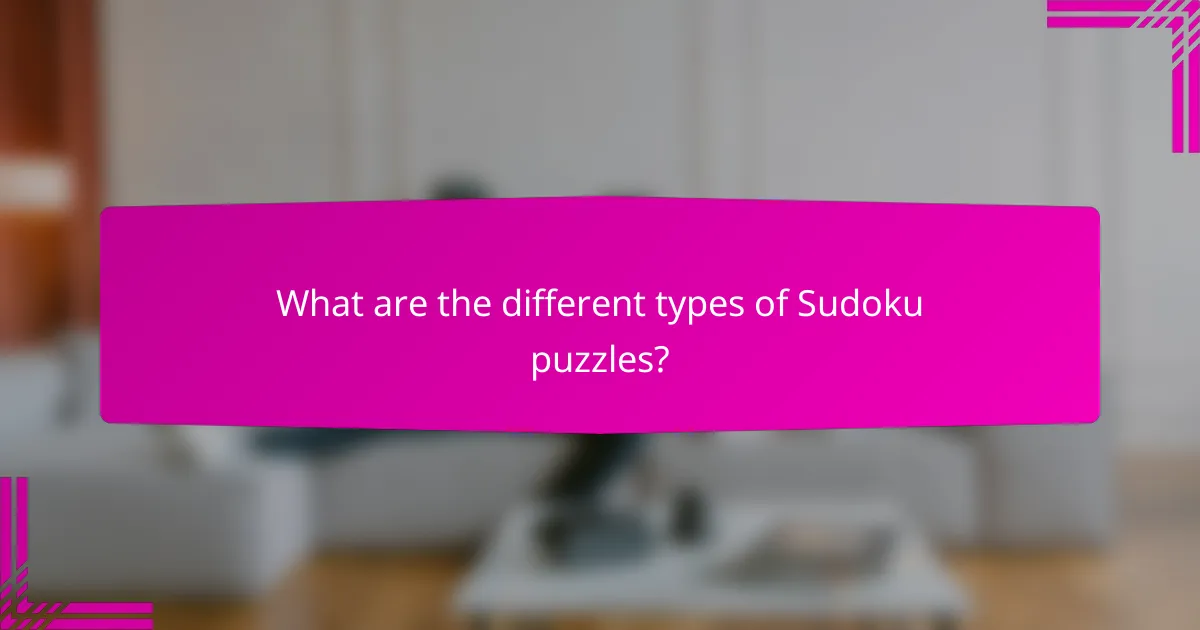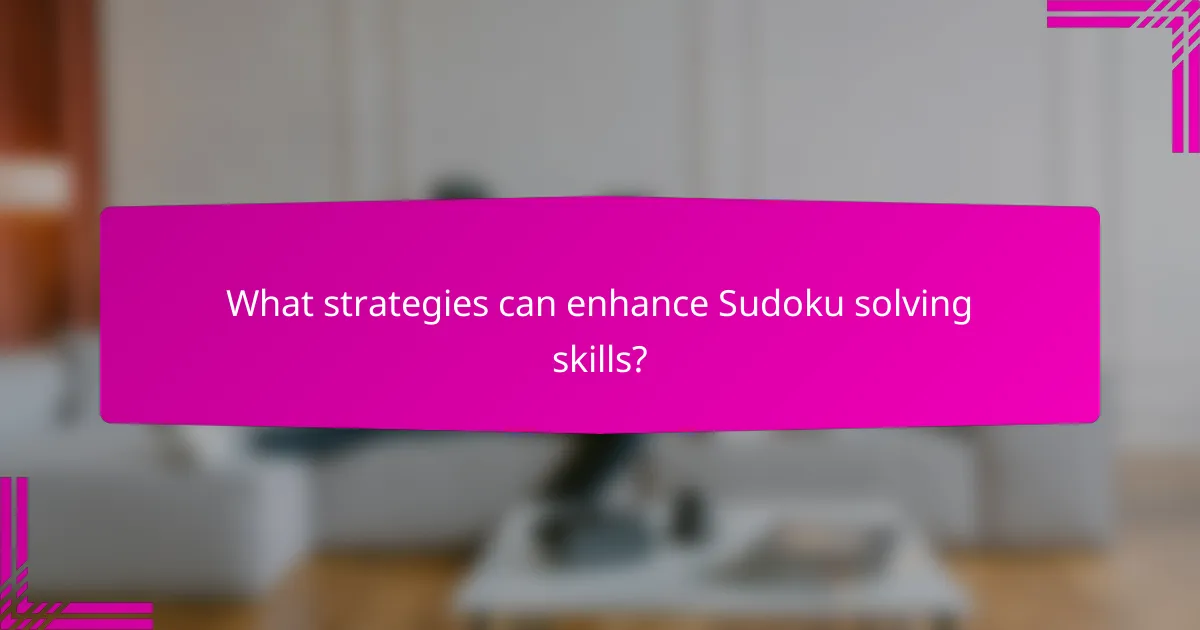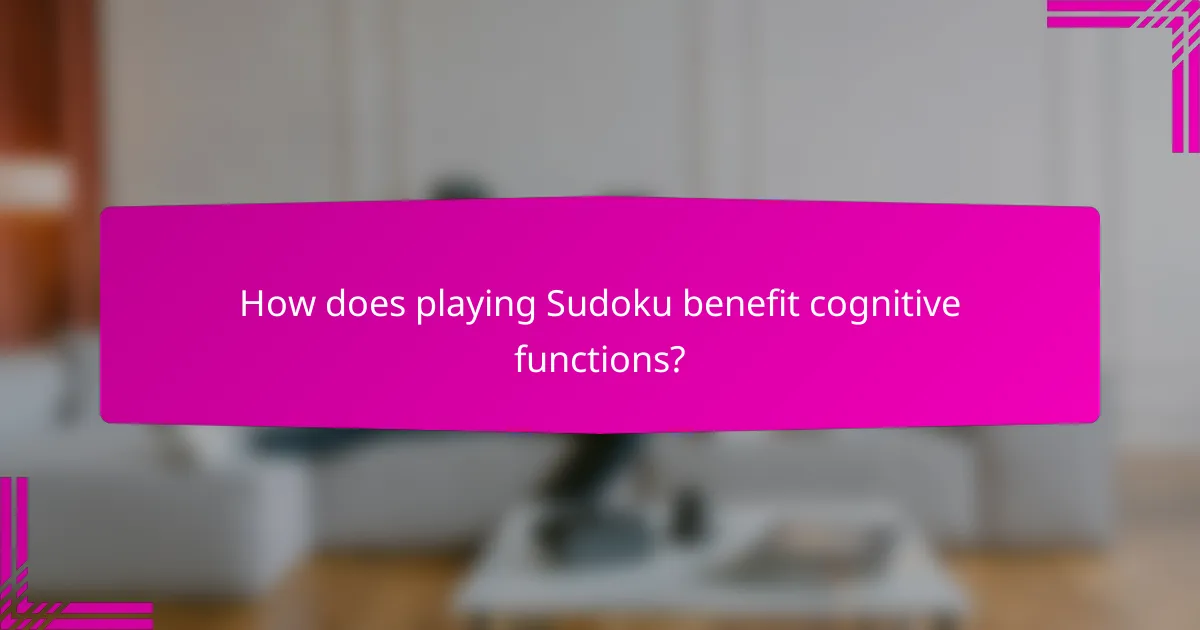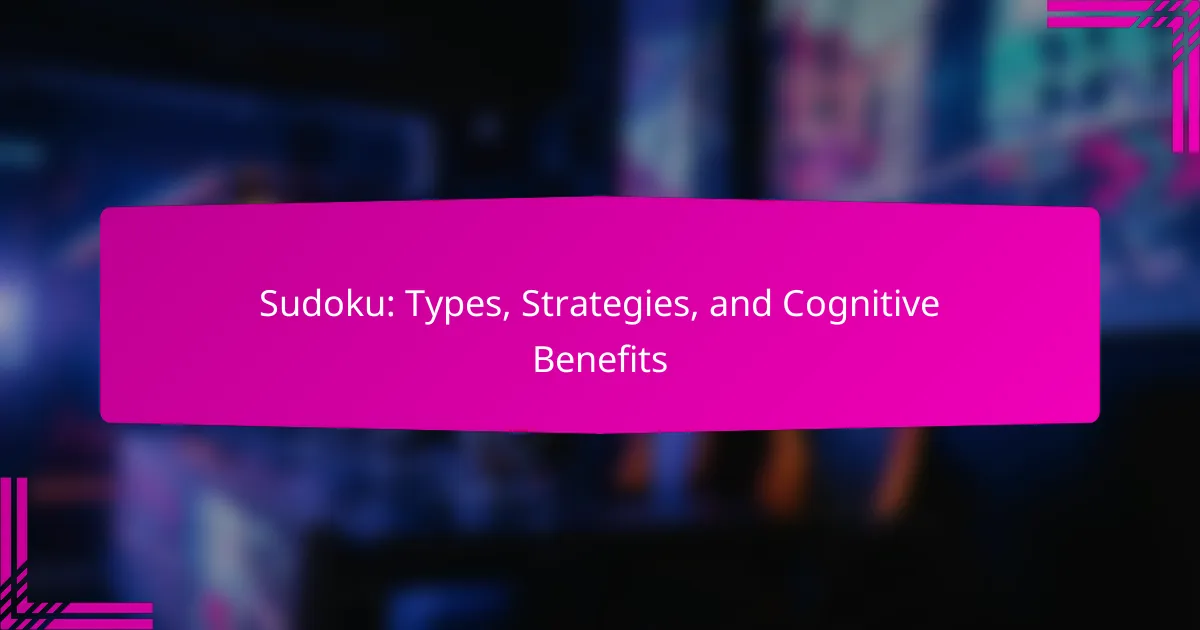Sudoku enhances cognitive functions like problem-solving, memory, and concentration. Explore the various types of Sudoku puzzles, learn effective strategies for solving them, and discover their cognitive benefits. Regular practice can improve logical reasoning and delay age-related cognitive decline, making Sudoku a valuable mental exercise.

What are the different types of Sudoku puzzles?
There are several types of Sudoku puzzles, each varying in complexity and rules. The primary types include Classic Sudoku, which features a 9×9 grid; Mini Sudoku, a smaller 4×4 or 6×6 grid; and Variants like Killer Sudoku, which combines Sudoku with arithmetic constraints. Other notable types are Hyper Sudoku, featuring extra regions, and Jigsaw Sudoku, where regions are irregular shapes. Each type offers unique challenges and cognitive benefits, enhancing problem-solving skills and logical reasoning.
How do classic Sudoku variants differ from modern adaptations?
Classic Sudoku variants emphasize traditional rules and grid sizes, while modern adaptations introduce new rules and themes. Classic versions maintain a 9×9 grid with standard number placement, focusing on logic and deduction. In contrast, modern adaptations may include irregular grids, additional symbols, or unique constraints, enhancing complexity and creativity. Classic Sudoku fosters cognitive skills like problem-solving and pattern recognition, whereas modern variations can diversify these benefits by encouraging flexible thinking and adaptability.
Which unique formats of Sudoku are popular in various regions?
Unique formats of Sudoku popular in various regions include Classic Sudoku, Samurai Sudoku, and Hyper Sudoku. Each format offers distinct rules and challenges that appeal to different audiences.
Classic Sudoku remains the most recognized format globally, consisting of a 9×9 grid divided into nine 3×3 subgrids. Samurai Sudoku features five overlapping grids, creating a more complex puzzle. Hyper Sudoku introduces additional regions, increasing the difficulty by requiring numbers to appear in specific 3×3 boxes.
Other unique formats include Killer Sudoku, which combines Sudoku with arithmetic, and Jigsaw Sudoku, where irregularly shaped regions replace standard boxes. These variations enhance cognitive engagement and provide diverse problem-solving experiences.
What are the characteristics of extreme difficulty Sudoku puzzles?
Extreme difficulty Sudoku puzzles are characterized by minimal given numbers, complex solving techniques, and a high level of logical deduction required. These puzzles often necessitate advanced strategies such as X-Wing or Swordfish for resolution. The unique attribute of extreme difficulty lies in the intricate relationships between numbers, leading to multiple potential pathways for solving. Players experience a significant cognitive challenge, enhancing problem-solving skills and concentration.

What strategies can enhance Sudoku solving skills?
To enhance Sudoku solving skills, practice regularly, learn advanced techniques, and develop logical reasoning.
Consistent practice improves familiarity with patterns and strategies. Explore techniques like naked pairs, hidden singles, and box-line reduction to solve puzzles efficiently. Additionally, cultivating logical reasoning enhances problem-solving capabilities, allowing for quicker deductions and solutions.
How do beginners approach Sudoku puzzles effectively?
Beginners can approach Sudoku puzzles effectively by following structured strategies. Start with scanning the grid for obvious numbers, filling in easy spots first. Use the process of elimination to narrow down possibilities for each empty cell. Gradually, focus on one number at a time, checking rows, columns, and boxes for conflicts. Practice consistently to enhance pattern recognition and improve problem-solving skills. Engaging with simpler puzzles builds confidence and understanding of the rules.
What advanced techniques do expert solvers use?
Expert solvers use advanced techniques like pattern recognition, candidate elimination, and forced moves to solve Sudoku puzzles efficiently. These strategies enhance their ability to identify potential placements and eliminate impossible options quickly.
Pattern recognition involves spotting common configurations, while candidate elimination narrows down choices based on existing numbers. Forced moves leverage the logic of the puzzle to dictate certain placements, often leading to breakthroughs in complex grids.
These techniques not only improve solving speed but also enhance cognitive skills such as logical reasoning and problem-solving.
Which common mistakes should players avoid when solving Sudoku?
Players should avoid common mistakes like overlooking basic rules, ignoring pencil marks, and making hasty assumptions. Careful analysis and methodical approaches enhance problem-solving.
1. Ignoring the rules: Ensure all numbers 1-9 appear once per row, column, and box.
2. Rushing: Take time to analyze each section before placing numbers.
3. Over-relying on pencil marks: Use them wisely to avoid confusion.
4. Failing to check for hidden singles: Look for numbers that can only fit in one place.
5. Not revisiting earlier placements: Reassess previous decisions as the puzzle progresses.

How does playing Sudoku benefit cognitive functions?
Playing Sudoku enhances cognitive functions by improving problem-solving skills, memory, and concentration. Engaging regularly challenges the brain, fostering neuroplasticity, which strengthens neural connections. Studies indicate that consistent Sudoku players exhibit better cognitive flexibility and increased mental agility. This mental exercise can delay age-related cognitive decline, making it beneficial for long-term brain health.
What specific mental skills are improved through regular Sudoku practice?
Regular Sudoku practice enhances various mental skills, including problem-solving, logical reasoning, and concentration. It promotes critical thinking by requiring players to analyze patterns and make decisions based on available information. Additionally, Sudoku improves memory retention as players recall numbers and strategies. Engaging with this puzzle fosters patience and perseverance, essential traits for tackling complex challenges. As a result, consistent practice not only sharpens cognitive abilities but also contributes to overall mental agility.
How does Sudoku contribute to memory enhancement?
Sudoku enhances memory by requiring players to recall numbers and patterns, improving cognitive function. The game’s structure promotes mental engagement, which strengthens neural connections. Regular practice can lead to better short-term and long-term memory retention. Additionally, it enhances problem-solving skills, further benefiting memory through active mental exercise.
What research supports the cognitive benefits of Sudoku?
Research indicates that Sudoku enhances cognitive functions such as memory, problem-solving, and concentration. Studies show that regular engagement with Sudoku can improve working memory and increase cognitive flexibility. For instance, a study published in the journal “Psychological Science” highlights that participants who played Sudoku exhibited improved mental agility and quicker information processing. Additionally, brain imaging research suggests that solving Sudoku activates areas responsible for logical reasoning and pattern recognition, further supporting its cognitive benefits.

Which tools and resources can aid in mastering Sudoku?
To master Sudoku, utilize various tools and resources that enhance problem-solving skills and strategies. Popular resources include Sudoku apps, online tutorials, and books dedicated to strategies and techniques.
Sudoku apps often feature interactive puzzles, hints, and difficulty levels, making practice accessible. Online platforms provide tutorials and forums for community support, while books offer in-depth strategies and cognitive benefits. Engaging with these tools can significantly improve your skills and understanding of the game.
What online platforms offer interactive Sudoku challenges?
Several online platforms offer interactive Sudoku challenges, including websites and mobile applications. Popular options are Sudoku.com, WebSudoku, and the Sudoku app by Brainium. These platforms provide various difficulty levels and features, enhancing user engagement. Many also include tutorials and tips to improve problem-solving skills.
How do mobile apps enhance the Sudoku playing experience?
Mobile apps significantly enhance the Sudoku playing experience by offering features that improve engagement and learning. They provide interactive tutorials, hints, and error-checking, which help players develop strategies and improve their skills. Additionally, apps often include various difficulty levels and customizable settings, catering to both beginners and advanced players. The ability to play on-the-go and access online leaderboards fosters a competitive environment, further motivating players. Overall, these attributes create a more immersive and enjoyable Sudoku experience.
What are the best books for learning Sudoku strategies?
The best books for learning Sudoku strategies include “Sudoku for Dummies” by Andrew Long, “The Sudoku Puzzle Book” by David J. Bodycombe, and “How to Solve Sudoku” by Thomas Snyder. These titles provide insights into various strategies, techniques, and cognitive benefits of Sudoku. Each book offers unique approaches, making them valuable for both beginners and advanced players.

What are the cultural impacts of Sudoku across different countries?
Sudoku has significantly influenced cultures worldwide by promoting cognitive skills and fostering social interaction. In Japan, it became a national pastime, enhancing puzzle-solving capabilities and mental agility. In Western countries, Sudoku supports cognitive benefits, such as improved memory and concentration. Additionally, it serves as a social activity, bringing people together through competitions and collaborative solving. Countries like Germany and the United States have embraced Sudoku, integrating it into newspapers and educational programs, showcasing its versatility and widespread appeal.
How has Sudoku influenced social interactions and communities?
Sudoku fosters social interactions and community building through collaborative solving and competitive play. It encourages friendships among enthusiasts, often leading to local clubs and online forums. These platforms facilitate sharing strategies and tips, enhancing cognitive skills collectively. Additionally, Sudoku events promote a sense of belonging, as participants engage in friendly competition, strengthening community ties.
Which events or competitions celebrate Sudoku enthusiasts?
Several events and competitions celebrate Sudoku enthusiasts, including the World Sudoku Championship and national tournaments. These events foster community engagement and skill development among players. The World Sudoku Championship, held annually, attracts top solvers globally, showcasing various formats and difficulty levels. National competitions, like the U.S. Sudoku Championship, provide local enthusiasts a platform to compete and improve their skills. Additionally, online platforms host regular contests, allowing participants to engage with a wider audience.
What role does Sudoku play in educational settings?
Sudoku enhances educational settings by improving problem-solving skills, logical reasoning, and concentration. It fosters critical thinking and can be integrated into curricula to support cognitive development. Research indicates that regular Sudoku practice can boost memory retention and enhance mathematical abilities. Additionally, it serves as an engaging tool for students, making learning enjoyable while reinforcing essential skills.
What practical tips can improve your Sudoku-solving efficiency?
To improve your Sudoku-solving efficiency, practice consistently, employ strategies, and maintain focus. Start with easier puzzles to build confidence. Use techniques like scanning, pencil marks, and elimination to narrow down possibilities. Time yourself to track progress and identify areas for improvement. Analyze completed puzzles to understand your mistakes and learn from them.
